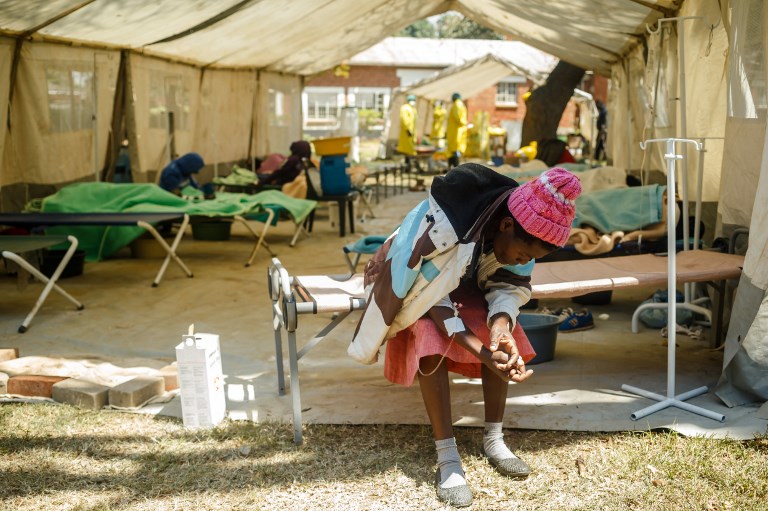
At least 18 people have died over the past week in the Zimbabwe capital Harare and scores fallen ill after a cholera and typhoid outbreak in some areas, authorities said on September 10, 2018. / AFP PHOTO
HARARE, Zimbabwe (AFP) — The death toll in Zimbabwe’s cholera outbreak has risen to 28, state media said Sunday, as the health minister announced new antibiotics were being used after the disease strain was found to be resistant to some drugs.
The cholera outbreak, first detected in a township outside the capital Harare earlier this month, prompted the government to declare an emergency in the city after at least 3,000 cases were reported.
“Although I cannot say we have contained the disease as yet, we are moving swiftly in all provinces of the country,” health minister Obadiah Moyo told the state-owned Sunday Mail.
“We have moved into the second line of antibiotics, which is azithromycin, after the first line of antibiotics — ciprofloxacin and ceftriaxone — have become resistant to the disease.”
Moyo said rubbish dumps would be removed from high-risk areas of Harare, sewer pipes would be repaired and street food vendors had been ordered to halt work.
Authorities have banned public gatherings in the city as a health measure, forcing the opposition MDC party to call off a major rally on Saturday.
Newly-appointed Finance Minister Mthuli Ncube last week launched a crowd-funding effort to raise money to fight the outbreak, publicising bank details on Twitter and appealing for donations.
Cholera outbreaks have occurred regularly in Zimbabwe as authorities struggle to provide potable water and sanitation facilities.
The cash-strapped country, which was ruled by Robert Mugabe from independence in 1980 until his ousting last year, suffered its worst cholera outbreak in 2008.
A total of 4,000 people died and at least 100,000 people fell ill.
UNICEF advised Zimbabweans to prevent cholera spreading by regular hand-washing, drinking only safe water, washing food, cooking it throughly and avoiding shaking hands.
© Agence France-Presse







